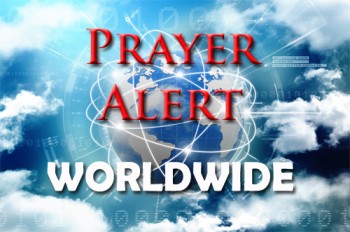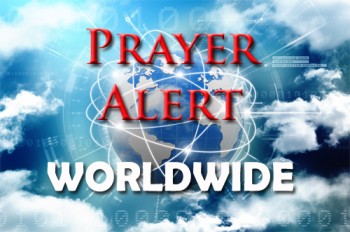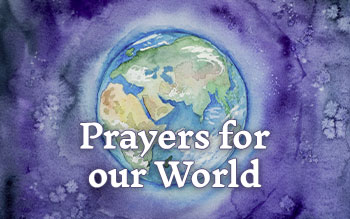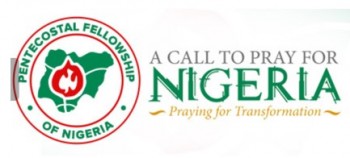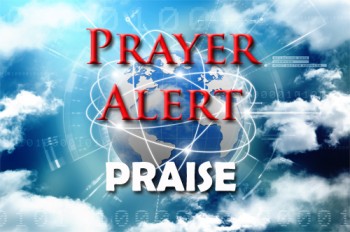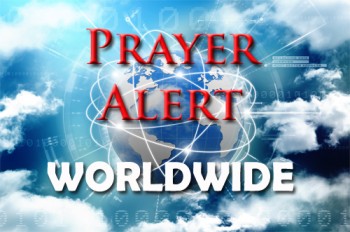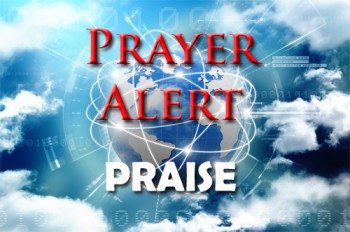Displaying items by tag: Africa
Nigeria: stop killing in Southern Kaduna
Since January there have been constant murders, looting, rape and abductions of Christians in Southern Kaduna. On 9 August a series of short videos entitled ‘Stop the Killings in Southern Kaduna’ was released as part of a campaign calling for an end to targeting Christian communities. The videos feature high-profile celebrities, actors, comedians, music artists and business executives. The president of the Southern Kaduna Peoples Union said, ‘There is no greater lie than the narrative that the killings in southern Kaduna are between farmers and herders. 75% of the victims were women and children’. CSW has called for effective action to address the situation and echoes the Nigerian entertainment industry which has spoken out about the relentless loss of life. CSW says, ‘We continue to call for urgent international interventions, including the convening of a special session of the UN human rights council, with particular focus on the current crisis in southern Kaduna and Plateau State.’
Burkina Faso: climate change forces children into dangerous work
Farming used to be a key source of income in Burkina Faso, but the climate crisis has made the weather unpredictable, crops fail, and families have few other opportunities to earn money to survive. 80% of the population is dependent on agriculture to earn an income. When crops fail, families go hungry, and they are forced to make hard decisions so that they can survive. Parents are now sending their children to work in the gold mines. It is dangerous and no place for a child, nevertheless thousands of children now work there. They work instead of going to school, and miss out on being children, playing with their friends, learning, and dreaming. However, Tearfund’s local partner CREDO is working with farmers to help restore the soil and provide training on new farming techniques and harvesting climate-resistant crops.
Mozambique: churches burned, beheadings and coronavirus
On 23 July the Catholic bishop of Pemba spoke out deploring the world’s indifference to escalating extremist violence in northern Mozambique, where multiple churches have been burnt, people beheaded, young girls kidnapped, and over 200,000 people displaced by the violent insurgency. Parliamentarian Paulo Rangel said. There are reports of insurgents beheading fifteen people in a week. Pray for the Church as it works with families who have suffered attacks and have lost everything. Also there is coronavirus in nine out of Mozambique’s ten provinces. Pray for organisations focusing on preventing contagion by disseminating information and raising awareness. Pray for those distributing essential aid to meet families’ immediate needs, including food, seeds, and hygiene kits. See https://www.actionaid.org.uk/about-us/where-we-work/mozambique
Nigeria: 'Incessant killing more dangerous than Coronavirus'
Report on Nigeria to UK Parliament
“The incessant killing is more dangerous than Coronavirus” …The words of a community leader in central Nigeria – after coronavirus had reached his country – after an April attack in which nine people died, including a pregnant woman and her three year old.
His reaction is one of several testimonies – frequently harrowing to read, let alone to have experienced – that feature in an Inquiry into the scale of death and destruction caused by conflict occurring along the Christian-Muslim faultline running across the ‘Middle Belt’ of Nigeria, Africa’s most populous nation.
The Inquiry is published today, 15 June, by the All Party Parliamentary Group (APPG) for International Freedom of Religion or Belief of the UK Parliament; it has been taking evidence since autumn 2018.
(However, since the Coronavirus pandemic, violence appears to have grown even as international media have been otherwise occupied).
“APPG members have been alarmed by the dramatic and escalating violence in Nigeria characterised as the farmer-herder conflict. This violence has manifested along ideological lines, as the herders are predominantly ethnic Fulani Muslims and the farmers are predominantly Christians. There has been significant debate about what factors are driving and exacerbating this crisis. Therefore, the APPG launched a parliamentary inquiry to help develop a nuanced understanding of the drivers of violence”.
The resulting report ‘Nigeria: Unfolding Genocide?’ points out that the violence has claimed the lives of thousands of people and displaced hundreds of thousands more. It has caused untold human and economic devastation and heightened existing ethno-religious tensions. “The [age old farmer-herder] conflict has evolved from spontaneous reactions to provocations and now to deadlier planned attacks” it quotes the International Crisis Group as saying.
Despite the scale of the violence, the conflict is much less well known internationally than the 10 year long Boko Haram insurgency which has claimed over 30,000 lives (112 Chibok girls are still ‘missing’ after 6 years) and now its offshoot Islamic State West African Province’s (ISWAP) atrocities. These also feature in the APPG report and appear to have escalated in recent weeks and months. (In the latest Boko Haram-linked incidents this past week, over a hundred have died and hundreds more been injured; a UN humanitarian hub and a police station were reported burned down).
However, this APPG report echoes the Global Terrorist Index (GTI) 2019 by the Institute for Economics and Peace, which indicates that the primary driver of the increase in violence in sub-Saharan Africa is a rise in activity in Nigeria attributed, not to Boko Haram, ISWAP or Ansar ul Islam, but to Fulani militant extremists. In 2018, it appears Fulani extremists were responsible for the majority of terror-related deaths in Nigeria.
Its geographical footprint is also larger, with conflict manifesting in more States.[1] According to global NGO, Search for Common Ground (SfCG), “between 1 January 2019 and 1 January 2020, inter-communal violence represented the most severe threat to civilian lives in Nigeria.”[2]
In his report for the UK’s Foreign and Commonwealth Office a year ago, the Bishop of Truro concluded “the religious dimension is a significantly exacerbating factor” in clashes between farmers and herders and “targeted violence against Christian communities in the context of worship suggests that religion plays a key part.”[3]
The Nigerian Government’s attempts to resolve the ethno-religious conflict have been ineffective; there seems to be no end in sight. The long-term consequences of failure to reduce the violence are severe, says the Inquiry: “There is the enormous cost in terms of human lives but there is also the potential for economic collapse, famine, further mass displacement of civilians and even more conflict, as the two major religious groups in the country become increasingly polarised”.
Pray: that the perpetrators of these atrocities will be brought to justice.
Pray: for the victims and families of these terrorist attacks.
Pray: for a breakthrough in the efforts of the Nigerian government to broker lasting peace in the region.
Pray: that the world community will come together to bring about pressure on the Nigerian politicians to deal with the situation at all levels.
Pray: against the powers of darkness that they will be overcome IJN.
Nigeria: PLEA FOR INTERCESSION – Pastor Austen Ukachi
Nigeria is presently passing through one of her most difficult times in history. The church is facing an existential threat from islamists with a clear agenda to overrun the entire nation.
Unfortunately, there is a conspiracy of silence by the international media concerning the atrocities taking place in Nigeria (similar to what happened in 1994 before the genocide in Rwanda). In an opinion piece on The Wall Street Journal of 20th December, 2019, Bernard-Henri Lévy wrote: “A slow-motion war is under way in Africa’s most populous country. It’s a massacre of Christians, massive in scale and horrific in brutality. And the world has hardly noticed.”
In recent years, Nigeria has been consistently ranked among the top five nations on the Global Terrorism Index. Of the four deadliest terrorist groups in the world, three operate in Nigeria: Islamic State of West Africa Province, ISWAP, an offshoot of ISIS; Boko Haram; and Fulani Herdsmen (militants). In Nigeria, the three groups are united in their goal to exterminate Christians especially in Northern Nigeria and ultimately make Nigeria an Islamic nation. They seem to have the will and wherewithal to accomplish their goal unless the Lord stops them.
In the past, they were restrained by government’s honest prosecution of the war against terrorism. But in the last five years, a new government, led by people who have been accused of being sympathetic to the Islamic agenda, has been unsuccessful in stemming the rampage of the terrorist groups. Curiously, almost the entire military and security agencies of Nigeria are under the control of devout Muslims (mostly Fulanis), some of whom have been accused of aiding and abetting the terrorists. A respected former president of Nigeria, Chief Olusegun Obasanjo, has openly accused the government of having a “fulanisation and islamisation agenda.”
The well-known historian and theologian, Professor Philip Jenkins, in his book entitled, The Next Christendom, aptly stated that: “At least, 45% of Nigerians are currently Christians, some 72 million people. But how will the number change in future decades? No church or religion has a guaranteed market share in any country. It is quite possible to imagine a scenario in which the proportion of the Nigerian Christians could fall as low as 10% in the event of persecution or a successful jihad by the nation’s Muslims. The figure could rise higher if a sweeping Christian revival were to occur.” The activities of the terrorists and the policies of the government are tending towards the former. The only acceptable option for the church in Nigeria is revival, that is why we must pray.
See Obianuju Ekeocha's emotive video pleading for prayer and action on this serious situation in Northern Nigeria. It contains graphic images of the Kukum Daji massacre aftermath that took place in July 2020:
The following prayer points are only a guide. May the Lord bring us to the depth of prayers that would stem this rising tide of violence in Nigeria.
1. TERRORIST GROUPS. ISWAP, Boko Haram, and Fulani Herdsmen are ranked 2nd, 3rd and 4th on the Global Terrorism Index. The Nigerian government does not still consider militant Fulani Herdsmen a terrorist group. This has enabled them to continue with their mayhem against Christian communities while the security officers look the other way. The activities of the herdsmen now extend to virtually every part of the country. There are speculations that it is a modern form of jihad. Pray that God would stir up a national and international outcry and action against these groups.
2. PERSECUTION OF CHRISTIANS IN THE NORTH. Pray that God would strengthen the Christians in the north. Many pastors and their members have been murdered by Islamic fundamentalists. Sometimes, these executions are carried out in the community square before children and other onlookers to inflict further pain on those who survive. Many of these Believers have been traumatised and scared for life. Pray for God to heal their emotions and strengthen their faith.
3. ECONOMIC JIHAD. There is an ‘economic jihad’ that is being waged against non-Muslims, especially Christians. Christians are losing their jobs and are being replaced by Muslims; Christian farm lands are either expropriated by state governments in the North or forcefully taken over by Fulani herders. Pray for God to comfort and provide for His people in their sufferings.
Download the full Nigeria Prayer Guide with 16 different prayer pointers from the IPC Website
Pastor Austen Ukachi – IPC West Africa Director
The Gambia: making the hyena pay
Yahya Jammeh, the Gambia’s brutal former dictator, may soon lose his vast mansion in Maryland, in a much anticipated step by the US Department of Justice. He paid US$3.5 million for it in 2010 with funds stolen from the Gambian people. In 2017 he fled to Equatorial Guinea. In the short time since Jammeh was ousted from office, the country has shown progress in many critical areas. There are encouraging signs that the repression and violation of basic rights that marked Jammeh’s time in office are slowly being changed by a commitment to democratic norms, good governance, and the rule of law.
Intercessor Focus: coronavirus around the continents
In Central America, people will struggle to eat in today’s lockdown; unable to provide for themselves and their families with food banks closed due to pandemic lockdowns. Pray for God to support those who are providing aid to families in Guatemala, El Salvador, Honduras, and other vulnerable countries. India has a social stigma around the ‘unclean’ disease, so individuals returning from isolation are treated as outcasts. To avoid being labelled and discriminated against people hide the illness, avoid tests and delay hospitalisation, with fatal consequences. Pray for this ‘unclean pandemic caste’ to be helped and healed not shunned. Africa’s virus is spreading rapidly. Rural areas in Tanzania have no food, and people like the cattle people in Kajiado (who depend on livestock markets) suffer because all markets are closed. Meanwhile, some Caribbean islands are now reopening for tourism with strict public health protocols. Pray for safe ‘sun, sea, sand and social distancing.’
Democratic Republic of the Congo: turmoil, violence, pandemic
2019 saw Felix Tshisekedi elected president in disputed elections marred by violence. Ethnic tensions between Lendu and Mema saw 1,000+ deaths and another 1,300+ abducted or kidnapped, while the Ebola crisis took more lives. 2019 is being violently repeated in 2020. On 22 July authorities started cracking down on peaceful critics, journalists, and political party members using pandemic emergency measures as a pretext to curb political protests(see). Since 13 July hundreds have been demonstrating for the dissolution of parliament. This has been organised by the Catholic Church (see). Authorities are attempting to contain several health crises: coronavirus, the largest measles outbreak in the world, and two Ebola epidemics (see). Also rural violence is escalating: a Christian worker writes, ‘The route from Aru to Bunia is still not safe. If people want to reach Bunia they are accompanied by soldiers. But those who were killed last time were accompanied by soldiers who were also killed.’
Sudan Christians beginning to feel welcome
After more than three decades of Islamist rule, Sudan has passed reforms that include allowing non-Muslims to drink alcohol and have abolished the apostasy laws and flogging. From a Christian perspective, reforming the laws of the old regime allows Sudanese Christians to feel welcome in their country again now that Sudan is moving towards a government based not on religious values, but on general human rights is a major development. Pray that this move leads to an ongoing democratic transformation; so that continued reforms within government and society will favourably impact the lives of all minorities. Pray for Sudanese Christians to take advantage of new freedoms and begin to provide hope to the Muslim majority population.
Covid conversions
Jonas is a Kenyan church planter and respected leader in his village. When Kenya shut down due to coronavirus villagers lost their jobs and income, food prices rose and families struggled. Jonas saw that they not only needed Jesus, they needed help. He used his wages to buy food for the needy. Others were inspired by his generosity and donated food to be distributed to vulnerable families. Other church planters joined him in food aid and sharing Jesus' love. The results were astounding. 863 people heard the Good News, 211 received Christ. A Muslim man named Aasir lost his job and his home. Jonas took them in. Aasir saw what it was like to walk in a relationship with Jesus, day in and day out, and he also surrendered his life to Christ.
